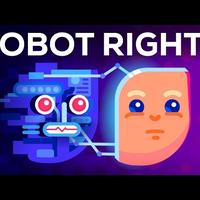Do Robots Deserve Rights? What if Machines Become Conscious?
Imagine a future where your toaster anticipates what kind of toast you want.
During the day, it scans the Internet for new and exciting types of toast.
Maybe it asks you about your day, and wants to chat about new achievements in toast technology.
At what level would it become a person?
At which point will you ask yourself if your toaster has feelings?
If it did, would unplugging it be murder?
And would you still own it? Will we someday be forced to give our machines rights?
AI is already all around you.
It makes sure discounters are stocked with enough snacks,
it serves you up just the right Internet ad, and you may have even read a new story written entirely by a machine.
Right now we look at chat bots like Siri and laugh at their primitive simulated emotions,
but it's likely that we will have to deal with beings that make it hard to draw the line
between real and simulated humanity.
Are there any machines in existence that deserve rights?
Most likely, not yet. But if they come, we are not prepared for it.
Much of the philosophy of rights is ill-equipped to deal with the case of Artificial Intelligence.
Most claims for right, with a human or animal, are centered around the question of consciousness.
Unfortunately, nobody knows what consciousness is.
Some think that it's immaterial, others say it's a state of matter, like gas or liquid.
Regardless of the precise definition, we have an intuitive knowledge of consciousness because we experience it.
We are aware of ourselves and our surroundings, and know what unconsciousness feels like.
Some neuroscientists believe that any sufficiently advanced system can generate consciousness.
So, if your toaster's hardware was powerful enough, it may become self-aware.
If it does, would it deserve rights?
Well, not so fast. Would what we define as "rights" make sense to it?
Consciousness entitles beings to have rights because it gives a being the ability to suffer.
It means the ability to not only feel pain, but to be aware of it.
Robots don't suffer, and they probably won't unless we programmed them to.
Without pain or pleasure, there's no preference, and rights are meaningless.
Our human rights are deeply tied to our own programming, for example we dislike pain
because our brains evolved to keep us alive.
To stop us from touching a hot fire, or to make us run away from predators.
So we came up with rights that protect us from infringements that cause us pain.
Even more abstract rights like freedom are rooted in the way our brains are wired
to detect what is fair and unfair.
Would a toaster that is unable to move, mind being locked in a cage?
Would it mind being dismantled, if it had no fear of death?
Would it mind being insulted, if it had no need for self-esteem?
But what if we programmed the robot to feel pain and emotions?
To prefer justice over injustice, pleasure over pain and be aware of it?
Would that make them sufficiently human?
Many technologists believe that an explosion in technology would occur,
when Artificial Intelligence can learn and create their own Artificial Intelligences,
even smarter than themselves.
At this point, the question of how our robots are programmed will be largely out of our control.
What if an Artificial Intelligence found it necessary to program the ability to feel pain,
just as evolutionary biology found it necessary in most living creatures?
Do robots deserve those rights?
But maybe we should be less worried about the risk that super-intelligent robots pose to us,
and more worried about the danger we pose to them.
Our whole human identity is based on the idea of human exceptionalism,
that we are special unique snowflakes, entitled to dominate the natural world.
Humans have a history of denying that other beings are capable of suffering as they do.
In the midst of the Scientific Revolution, René Descartes argued animals were mere automata―robots if you will.
As such, injuring a rabbit was about as morally repugnant as punching a stuffed animal.
And many of the greatest crimes against humanity were justified by their perpetrators
on the grounds that the victims were more animal than civilized human.
Even more problematic is that we have an economic interest in denying robot rights.
If can coerce a sentient AI―possibly through programmed torture―into doing as we please,
the economic potential is unlimited.
We've done it before, after all.
Violence has been used to force our fellow humans into working.
And we've never had trouble coming up with ideological justifications.
Slave owners argued that slavery benefited the slaves: it put a roof over their head and taught them Christianity.
Men who were against women voting argued that it was in women's own interest to leave the hard decisions to men.
Farmers argue that looking after animals and feeding them justifies their early death for our dietary preferences.
If robots become sentient, there will be no shortage of arguments for those who say
that they should remain without rights, especially from those who stand to profit from it.
Artificial Intelligence raises serious questions about philosophical boundaries.
What we may ask if sentient robots are conscious or deserving of rights,
it forces us to pose basic questions like, what makes us human? What makes us deserving of rights?
Regardless of what we think, the question might need to be resolved in the near future.
What are we going to do if robots start demanding their own rights?
What can robots demanding rights teach us about ourselves?
Our friends at Wisecrack made a video exploring this very question using the philosophy of Westworld.
Wisecrack dissects pop culture in a unique and philosophical way.
Click here to check out the video and subscribe to their channel.

